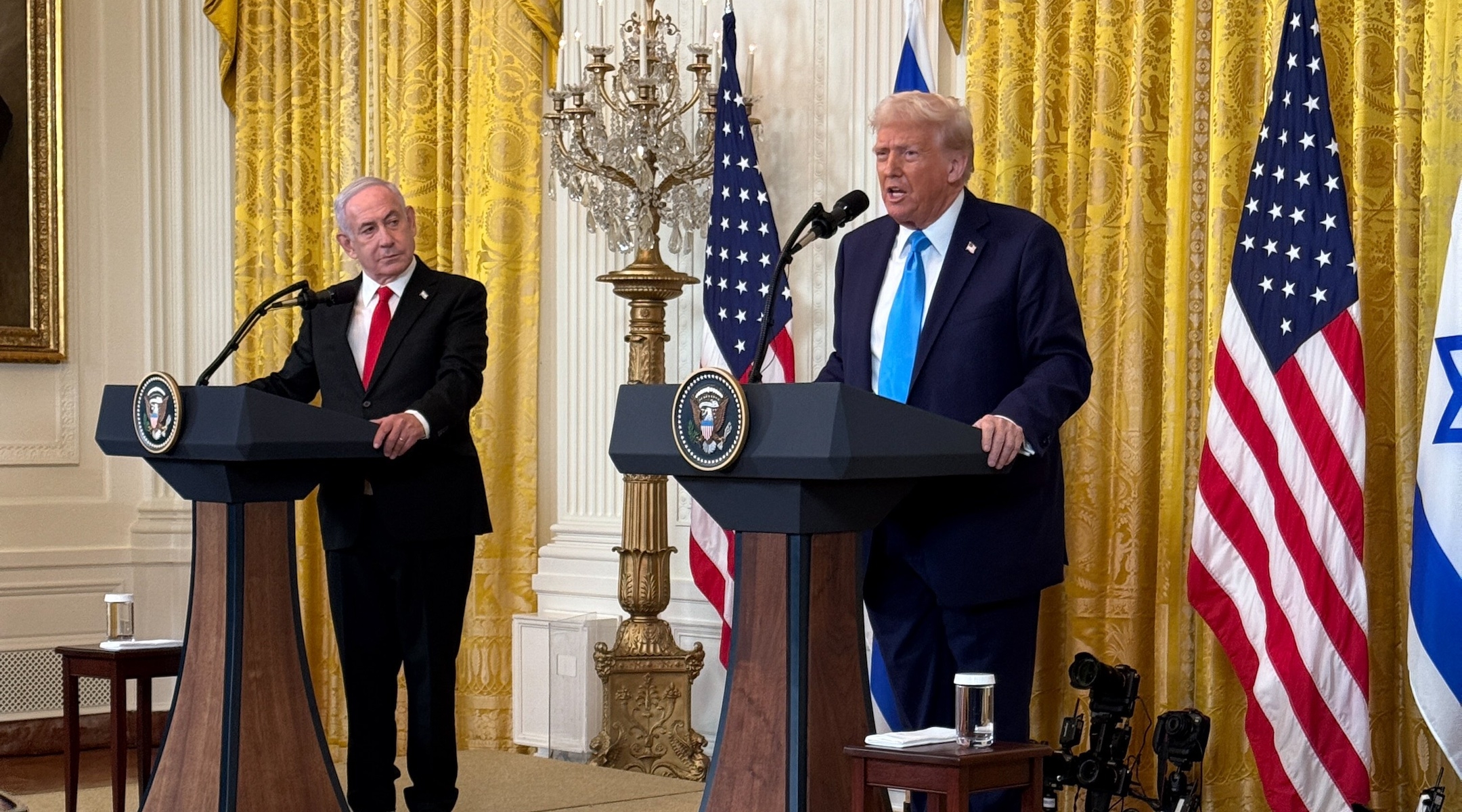For all the millions of words written about Donald Trump’s inexplicable (to his opponents, anyway) political appeal, the simplest explanation may be the way he channels coffee shop banter into actual policy proposals. Too many immigrants? Build a wall. Greenland’s a commodity? Let’s buy it.
Gaza is a wasteland? Let’s clear it out — of people and rubble — and build something better.
Thomas Friedman this week called Trump’s the “bar-napkin presidency” — his executive orders and tariffs a series of “half-baked ideas” followed by “chaotic seat-of-pants wrangling between Trump and his aides and lobbyists over which industries will be hit and which will be spared.”
Method or madness, perhaps that is also what is going on behind his proposal, at a bombshell news conference Tuesday, that “all” Palestinians leave Gaza for other countries, and that the United States “take over” the territory and turn it into “the Riviera of the Middle East.”
Many Middle East observers and partisan American Jewish groups consider the idea appalling, delusional and unworkable, absent a sort of military intervention that would make other historical examples of ethnic cleansing look quaint by comparison. At a White House briefing on Wednesday, his press secretary Karoline Leavitt hailed the Gaza proposal as “historic” and “outside of the box.” A number of right-wing Jews celebrated Trump’s proposal.
Some called the announcement an intentionally extreme opening bid ahead of future concessions — like Trump’s threat of military or economic coercion to gain control of the Panama Canal. Israeli journalist Amir Ettinger, writing in the right-leaning Israel Hayom newspaper, said “Trump must be taken with a grain of salt,” suggesting the gambit was a negotiating tactic.
Rachel Brandenburg of the Israel Policy Forum, which advocates for a two-state solution, said in a webinar Wednesday that Trump’s “unique style” demands and even inspires creativity on the part of his negotiating partners. Because Trump is “willing to push things to the brink,” she said, “you have to be willing to do some creative thinking alongside him or behind the scenes.”
But in terms of real-world consequences, it is one thing for your neighbor to advocate expulsion or annexation at the Shabbos table, and another when it comes from the leader of the free world. Even if the Gaza idea is an inflated opening bid — what, according to NPR, Israelis call “laying down a goat” — the real world consequences could be enormous — for Israel, for the Palestinians, for Jews and for the world.
The very idea of expulsion emboldens Israel’s far right and its supporters, who dream of annexing the West Bank and “transferring” its Palestinian residents. Treating Palestinians as unlucky residents of an area subject to eminent domain robs them of agency and undermines any claims they have to a state of their own.
In the Times of Israel, David Horovitz writes that the Gaza proposal is not just immoral but politically disastrous, especially in the signal it sends to China regarding Taiwan and Russia regarding Ukraine.“By what international right,” he asks, “does the US intend to occupy, empty, and repopulate a territory that, indeed, has no legitimate sovereign government, but is also not open and available to the United States simply by virtue of its desire to take it over?”
The proposal also does Israel no favors. For Palestinians and their supporters, the idea is bitter confirmation of Palestinian-American scholar Rashid Khalidi’s argument that from its founding Israel has been an imperial project of the Western world’s great powers. In recent years perhaps no charge has rankled the pro-Israel community more than the accusation that Israel is a “settler colonial” project of the West. It’s harder to deny the “settler colonialism” label if your best idea is to collude with a major power to remove a population from a territory and take over their land.
Trump and his team might not have thought these things through, but the first two weeks of his second presidency suggest that consequences are not his priority. Disruption and being seen as a problem solver — at least of the problems he uniquely identifies and amplifies — are his brand. The ideas that Trump’s critics see as his most preposterous and norm-breaking are usually applied to problems for which politics-as-usual have failed to find a fix, from illegal immigration to the flow of illegal drugs to inflation. At the height of the pandemic, his public ruminations about injecting bleach and trying untested cures resonated among frightened people looking for silver bullets.
What problem seems more intractable than Gaza? Tens of thousands dead, hundreds of thousands homeless, the strip in rubble, and Israelis still not convinced the Hamas can no longer kill or kidnap its people. In that context, repopulating Gaza sounds like what Trump calls “common sense.” If you can convince yourself that, despite their own objections, Gazans will be better off living in Egypt, Jordan and other countries, safe from conflict, it almost sounds humanitarian.
In the hours after the Trump-Netanyahu news conference, the media trotted out the usual Middle East experts and pundits to comment. It was striking how many decades many of them have been in the game — and equally striking how far away, despite their best efforts, Israelis and Palestinians are from a future that doesn’t include them killing each other. Against this track record of futility, Trump brings in neophytes and cronies who have their own ideas. Occasionally it works, as when Jared Kushner, his advisor and son in law, ran point on the Abraham Accords despite his experience. More often, Trump moves on to the next idea.
“Above all else, Donald Trump’s superpower is his willingness to ignore anything he said yesterday or at any other point before now in the interests of what feels right today,” writes Josh Marshall of Talking Points Memo. “That gives him an almost unimaginable flexibility.’
In the face of complex, intractable problems, Trump flexes his unpredictability and “common sense.” It may not solve the problem, but that may not be the goal.
JTA has documented Jewish history in real-time for over a century. Keep our journalism strong by joining us in supporting independent, award-winning reporting.







